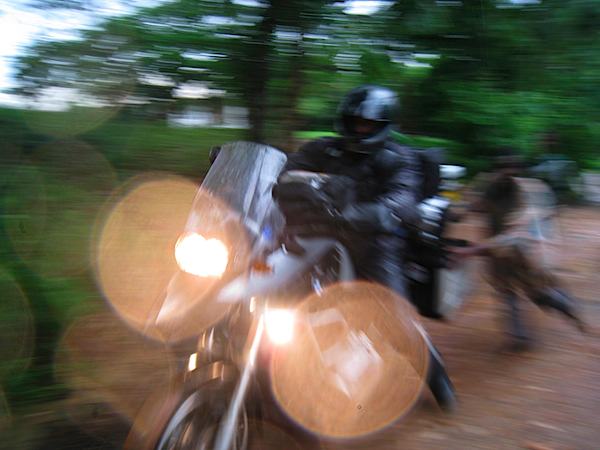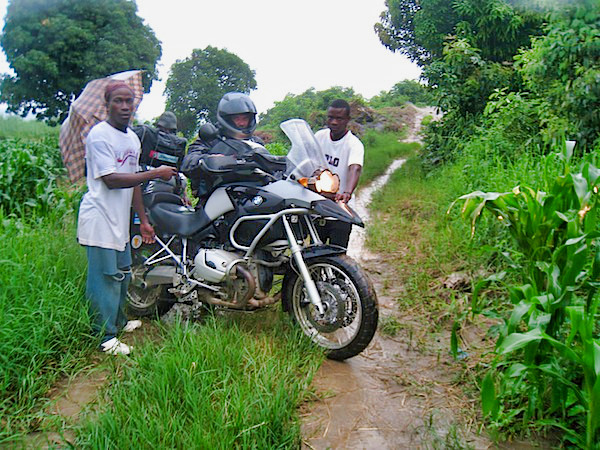Washed Up and Out In Nkhata Bay.
Sunrise over Lake Malawi.
Today not only would take us to Nkhata Bay, a tiny hamlet on the northern lake shore, but it would also take us on a seemingly endless (Egyptian) goose chase to find somewhere I could send funds to Ray Wilson in Zambia to cover the cost and transport of my replacement tire. (remember I did buy one and it flew off the back of my bike without me noticing?).
We came across this on the sandy muddy track from our lodge the next morning. Two days ago this hut’s foundation was washed away by torrential rains. A young girl broke her leg as the bricks came tumbling down when they were sleeping.
We never did find the charm of what was reported to be the most traditional large village in Africa when riding through the dusty byways of Nkhotakota. In typical Malawi fashion a local on a small motorcycle offered to help us find our way through town. At 8:30am he was riding a motorcycle with an open beer. Hoping off the motorcycle he grabbed his beer from its saddle on his handlebars and greeted us road side.
“You want to go to zee bestest place, right?” He was smiling while swirling another sip from his green Carlsberg, thinking we rolled into town looking for accommodation. I was looking for the colorful market as promised by the guidebooks. And I was hoping to find a Western Union. Ray would be sending my tire from Lusaka in Zambia with one of his employees to the town of Ketete just an hour or so from Chipata near the border of Malawi. Here in Chipata, Grant Le Roux from Lilongwe would have one of his trucks pick up the tire from the Dunavent office in Chipata and take it to Peter Kemp who in turn would put it on a truck to meet me in Mzuzu by 8am Saturday morning. But before this complicated rigamarole could happen, Ray needed his cash. I had hoped to leave the money with Peter who could give it Grant’s driver. But with Malawi’s per-capital GNP at just about $170, the $120 for my tire would be too much of a temptation and not a safe nor guaranteed bet.
But there was no Western Union office Nkhotakota and we couldn’t find the Livingstone Tree where Hastings Banda served numerous political speeches in the 60’s nor the tree where Daniel Livingstone convinced Chief Jumbe to end the slave trade in Malawi. We were told we could find Western Union just 50km north in Dwangwa.
Our friend who was self-described as a motorcycle mechanic was riding and drinking this beer at 8am the morning.
No sir there is no Western Union in Nkhotakota, but if you ever feel unsafe please stop at the police station and we will tend to you.
Following the signs from the main road down a muddy track toward the Standard Bank in Dwangwa we passed through a gated entrance to the Dwangwa Sugar Estate and then through about 4km of sugar cane fields and down another muddy track to a parking lot where beneath shade trees a tiny office of Standard Bank sat waiting. I couldn’t believe there was a bank in this company town. But I was relieved when I saw the MoneyGram® placard touting “send and receive money anywhere in the world.” At least I would check this task off my day and move on to exploring Lake Malawi and Nkhata Bay.
Maybe you can’t send a MoneyGram® from Dwangwa, but at least we’ll have a good bottle of wine with dinner tonight. (shot by Ronnie B.)
But the reality was much different than the perception. “No. You can only receive money here. No can send money.” The trainee teller wearing tie that barely reached the middle button of his pressed blue shirt.
I dragged the placard across the floor and showed him the sign, “look!” I pleaded, “it says SEND and RECEIVE money…I want to send money.” I was talking to myself. It was useless. I tried the other bank in town and received the same answer. Only receive. No send. This meant I’d need to head to Mzuzu which is 50km north of Nkhata Bay and about 100km north of where Ronnie and I hoped to enjoy our Malawi Lake Chill Experience. I resigned to the fact I’d be riding an even longer day so that I could get Ray his cash and that I could get my tire.
Blowing pass the lodges along the Chintheche Strip and a quick refueling stop in Nkhata Bay, we motored on to Mzuzu where interestingly enough Malawi president Bingu wa Mutharika was visiting causing traffic snarls and curious onlookers as a convoy of military vehicles and the ubiquitous black sedan breezed through town. The Malawi National Bank touting MoneyGram send and receive options wouldn’t let me send money without an account at that bank. Same thing at Standard Bank. My patience was running thin.
Directed to a Western Union office a few blocks away I was told here that the maximum I could send was the equivalent of $87.50. This wouldn’t work. Ray Wilson was expecting $120. So I suggested I send two Western Union cash transfers. Sorry. Only one per sender and one per receiver per week. This was getting out of hand. I convinced them to let Ronnie be one additional senders but they’d have to look the other way as I needed to send this cash to ONE RECEIVER. They agreed. And the money was sent.
Dealing with complex and beaurocratic tasks such as wiring money abroad can tax one’s patience. Ronnie acted as the second sender in order to get payment for my new tire to Ray Wilson in Zambia.
Ronnie has a predisposed position in travel where he doesn’t like to back track. And I can understand this. But there was no way I wanted to spend three days in Mzuzu waiting for my tire when just 50km south was the tropical-esque hamlet of Nkhata Bay – a small bay where sunrises and sunsets paint beautiful sky pictures and at nighttime fisherman in traditional canoes hang lights over the bay luring fish into nets near the shoreline. Convinced that Mzuzu wasn’t the place to stay we headed toward the bay with our eyes set on Mayoka Village – a budget accommodation highly recommended by other travelers and Lonely Planet.
Remember all that charcoal I’ve been seeing carting on backs of bikes and along the roadside in Zambia and south of here in Malawi? Well, at a police check point I asked about this sign. In this forested part of Malawi it is illegal to harvest trees and make firewood. Why? The policeman was happy to explain that Malawi must preserve its resources and not cut down trees for fear that one day there will be no more.
Getting directions from the petrol station to our accommodation in Nkhota Bay. (Ronnie B. photo)
With Ronnie taking lead we wandered through town and made a turn up a muddy dirt track and over a bridge and then up a horribly rutted and rocky road that had been deteriorated by incessant rains over the past week. Then the road made a turn toward Mayoka Village down a slippery and muddy clay track with ruts, rocks and loose sand. We managed but I feared getting out of there–especially if it rained.
Then the other shoe was dropped. There were no rooms and only two bunks in an 8-person dormitory available at Mayoka. Still reeling after last nights disappointment we both agreed that while Mayoka with its keen hillside location where chalets, restaurant and bar tumble down the hill toward the bay, we weren’t prepared to schlep our stuff to spend a night in a crowded dorm room. So we were guided to the Butterfly Lodge just next door.
What a disappointment. While the price was amazingly cheap, the Butterfly Lodge in Nkhata Bay is a perfect example of “you get what you pay for”. Dirty, flea-ridden and poorly laid out in order to get to the bathrooms and shower you had to tromp through reception, the restaurant and the kitchen. And the bar was just beyond that where the bartender cranked music through blown speakers. Dinner was good though feasting on a generous portion of Batata, a local fish found only in Lake Malawi.
We decided one night at Butterfly would suffice and while we hated to unpack and repack again the next day we’d find accommodation at one of the better lodges closer to town. I just hoped it didn’t rain. Cause with the serious downpours we’d experienced over the last week, the road out of Butterfly Lodge would be practically impassable as the red clay would turn into a slippery ice-like surface. Everyone working at the lodge had horror stories of cars not making it up the hill. I had nightmares of dropping doc and watching it slide down the incline.
The next morning things looked menacing but the clouds appeared off in the distance. My optimism got the best of me and before we were fully packed the rain started pouring. I walked to the hill and and my boot slid nicely and without drag on the clay road. There was a rocky rut made by drainage of the nightly rains but it looked testy and a bit scary. If there was traction to be had, this is where I’d get it. Ronnie and I contemplated our exit strategy. Putting money on the lowest risk we convinced a few of the workers to walk up with us on the bikes providing support should the bike begin to slide out. Ronnie wanted to wait for the rain to stop citing the fact he couldn’t see through his face-shield due to incessant fogging. Plus he hates getting wet. I reasoned and insisted that the more rain the more that road would fall apart and we could be stuck there even longer. He finally canned the silly idea of finding a truck to carry his bike up and down the hill and was willing to give it a try on his beastly GS1200.
I went first and was heavy on the throttle making it nearly impossible for these guys to hold on. I made it up with ease. For Ronnie it was more tenuous and he committed the unwanted sin and stalled mid-slope. He wanted to ride up the slippery clay, but his aides convinced him to follow the route I took. Eventually he made it up. That was part one. The rocky and rutted slope down to the village required intense concentration and careful line planning. End up on the clay and you could slide into a rut and get turned around and sidewise. But we managed.
The next lodge we tried Ronnie nearly got stuck in thick mud surrounded by pampas grass. The rain continued to pelt us. That’s when we decided to cut our losses and just go to Mzuzu and wait out my tire. I suggested that given his schedule and diminishing time that he move on and not wait for me. The tire is my problem. Not his. And I don’t want to hinder his trip nor compromise his experience. But he decided to stick it out and stay with me so we could cross the border into Tanzania and ride to Dar Es Salaam together.
This photo does nothing to show how steep this incline was nor how slippery the red clay mud was, but you can get the idea. Below Ronnie waits while his “pushing” crew gets ready.
He almost didn’t make it due to a slip and a stall midway. But success. Glad to be out of there. The rain lasted for two days after this and clearly we would have been stranded if we waited much longer.
At the top of the muddy mess with our helpers.
We did try to get to another lodge on level ground while the rain pelted the landscape. But after 500m down this muddy track Ronnie got stuck so we turned his big beast around and headed back to Mzuzu again — 50km north of Nkhata Bay.
After negotiating an amazing rate at the Sunbird Mzuzu we both were happy to get out of our wet gear, get a cold beer and have a bit of internet access where our down time could be spent catching up on our journals.
Ahhhh. Mzuzu. Who woulda thunk?





















Leave a Reply
Want to join the discussion?Feel free to contribute!